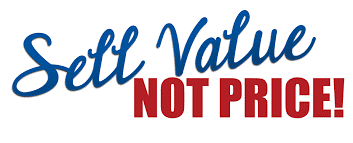One of the most common questions sales coaches are asked is how to grow sales & sell on value when it appears that the only thing that matters is a low price. As a salesperson, your success depends on your ability to help your prospect see the value your product or service provides & see it as worthy of the higher price. Selling to a prospect who places high importance on a low price is always difficult. This problem is magnified when your prospect is talking to
multiple competitors. To further magnify: Most people buying a product or service want the highest quality & best value at the lowest price. Safe to say: It ain’t easy!
We have outlined the following 8 keys as helpful in successfully selling a product or service that is higher than your competitors: even where it appears that the only thing that matters is a low price.
First, a question: Why would someone pay more for your product or service? Answer: If it was worth it (if they saw value). Otherwise, it’s over. If your rospects & customers see your product or service being exactly the same as your competitor, they won’t pay 12 if they can get it for 11. In this case you are reduced to a commodity. Are you selling a commodity? Didn’t think so.
Here are the 8 keys to successfully selling value, not price:
- Build your confidence
Part of the reason your product or service is worth more is because of the service & support you & your team provide. If you don’t believe that your product or service is worth more, it will be difficult for a customer to believe & pay more. You have to believe! - Remember, you often have more “price power” than you think
Fact is: You have more price power than you think. If the client still returns your calls & emails, or agrees to meet with you, you have power. If you had no power, they would stop engaging. - Ask great questions
Salespeople who lack confidence often ask closed ended questions that yield YES or NO answers with little information. Control the conversation by asking great questions (9 Knock-Out Q’s) that uncover a customer’s true problems & the importance of value to them. Ask, then listen. - Make sure you are dealing with the decision maker
If price is going to be the deal maker or breaker, there is no sense dealing with a person that can’t say YES. Competitors who steal your deals often tend to do it by gaining direct access to the decision maker, while the incumbent usually maintains their existing relationships with the user buyer with whom they are most comfortable. The incumbent is then left playing a challenging game of good-guy, bad-guy with the user & economic buyer/decision maker. That game is incredibly effective in forcing you to lower your price. Stay close to the person who bought! - Know your competition better than your customer
If you don’t know your competition, then you tend to take anything your buyer says about your competitor as true. To successfully defend a higher price, you need to know your competitors, & you need to know the truth. Do your research in advance: not being the best prepared undermines the value of your higher price. We are NOT suggesting you ever bash a competitor, but you do need to know them. - Focus on value first, brand second
Some people feel that the reputation of their brand deserves a higher price. Although the reputation of your brand may hold power, when it comes to price negotiations, the value that your brand brings to solve the problem (PAIN) of your buyer holds even more power. Whenever possible, get the prospect to tell you about the value they have received from your product or are expecting to receive from your product versus your competitors. You can also ask what they are missing (PAIN POINTS) by not using your product/service. - Develop options
When it comes to selling at a higher price, options help to change the buyer’s question to, “How will they use us?” Not, “If they will use us.” By adjusting price & value & developing a variety of options, you will find it easier to defend a higher price. - Sell the problem, not the solution
There is almost always a reason for your higher price. Most salespeople try to sell the solutions of their product or service. It is much easier to defend a higher price by selling the problem. If you buy the lowest priced back-up system & it fails in a catastrophe, what impact is that going to have on you & your company?
People pay more for products & services all the time. Starbucks coffee. Cadillac cars. iPhones. Louis Vuitton purses. Canada Goose coats. Bose speakers. Jimmy Choo shoes. Bottega Vanetta jeans. Hestan gas grills. Bettinardi golf clubs. Titleist Pro V1 golf balls . . . just a few examples.
Why?
They think it’s worth it.
